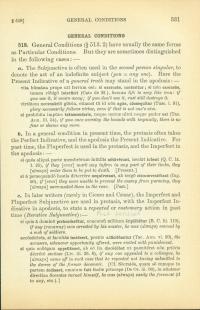518. General Conditions (§ 513.2) have usually the same forms as Particular Conditions. But they are sometimes distinguished in the following cases.
a. The subjunctive is often used in the 2nd person singular, to denote the act of an indefinite subject (you = any one). Here the present indicative of a general truth may stand in the apodosis.
Vīta hūmāna prope utī ferrum est: sī exerceās, conteritur; sī nōn exerceās, tamen rōbīgō interficit. (Cato de M.)
Human life is very like iron: if you use it, it wears away; if you don't use it, rust still destroys it.
Virtūtem necessāriō glōria, etiamsī tū id nōn agās, cōnsequitur. (Tusc. 1.91)
Glory necessarily follows virtue, even if that is not one's aim.
Sī prohibita impūne trānscenderis, neque metus ultrā neque pudor est. (Tac. Ann. 3.54)
If you once overstep the bounds with impunity, there is no fear or shame any more.
b. In a General Condition in present time, the protasis often takes the perfect indicative, and the apodosis the present indicative. For past time, the pluperfect is used in the protasis, and the imperfect in the apodosis.
Sī quōs aliquā parte membrōrum inūtilīs nōtāvērunt, necārī iubent. (Q. C. 9.1.25)
If they [ever] mark any infirm in any part of their limbs, they [always] order them to be put to death.
[Present]
Sī ā persequendō hostīs dēterrēre nequīverant, ab tergō circumveniēbant. (Iug. 50)
If [ever] they were unable to prevent the enemy from pursuing, they [always] surrounded them in the rear.
[Past]
c. In later writers (rarely in Cicero and Cæsar), the imperfect and pluperfect subjunctive are used in protasis, with the imperfect indicative in apodosis, to state a repeated or customary action in past time (Iterative Subjunctive).
Sī quis ā dominō prehenderētur, concursū mīlitum ēripiēbātur. (B. C. 3.110)
If any (runaway) was arrested by his master, he was (always) rescued by a mob of soldiers.
Accūsātōrēs, sī facultās incideret, poenīs adficiēbantur. (Tac. Ann. 6.30)
The accusers, whenever opportunity offered, were visited with punishment.
Sī quis collēgam appellāsset, ab eō ita discēdēbat ut paenitēret nōn priōris dēcrētō stetisse. (Liv. 3.36.8)
If any one appealed to a colleague, he [always] came off in such case that he repented not having submitted to the decree of the former decemvir./p>
cf. Sōcratēs, quam sē cumque in partem dedisset omnium fuit facile prīnceps (De Or. 3.60)
In whatever direction Socrates turned himself, he was (always) easily the foremost (if in any. etc.).

